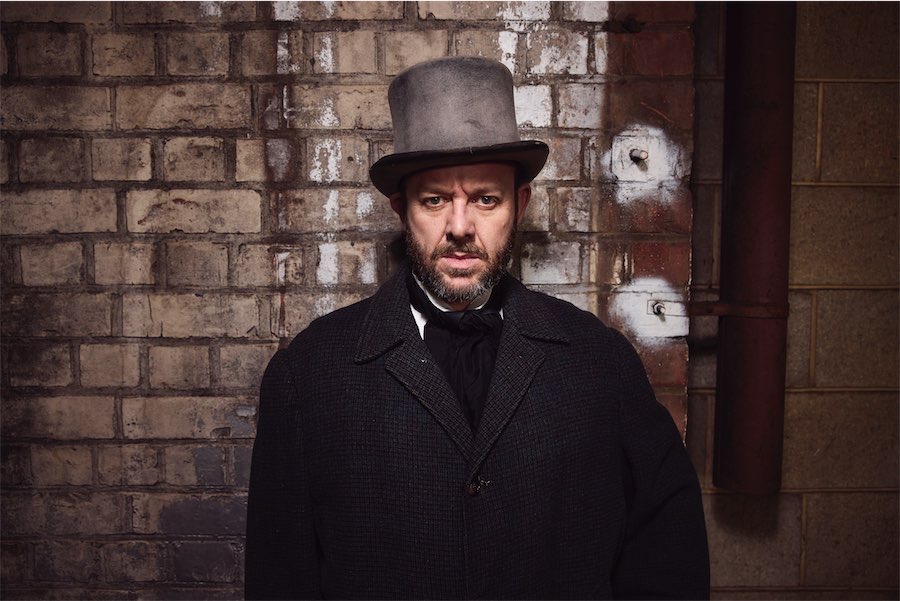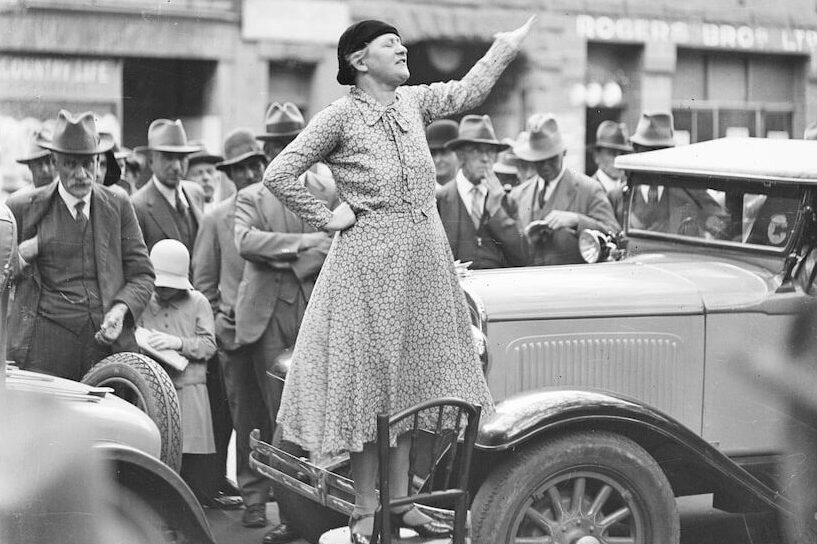
Charles Dickens is often credited with having invented Christmas as we now know it, so news that the Canberra Theatre’s next big production, Jack Maggs, is based on Dickens may have patrons quivering with pre-Yuletide excitement.
This is no turkey-and-plum-pudding romp, but rather a reworking of Great Expectations through the eyes of novelist Peter Carey and playwright Samuel Adamson, now staged by the State Theatre Company South Australia.
Jack Maggs is not a name familiar to many readers, but he’s actually Carey’s version of Magwitch, the enigmatic convict benefactor to the original novel’s hero, Pip.
The production by the company’s former artistic director, Geordie Brookman, will be one full of moving parts in an endless kaleidoscope of scenes from both the colonies and the old country.
When I catch up with Mark Saturno, who plays Maggs, I find that there are three levels to the show – Dickens, Carey and Adamson.
“Peter Carey wanted to reclaim the conventional story from the time when convicts weren’t seen as people, were transported, never to be heard of again with nobody caring what happened to them – atrocious,” Saturno says.
“He wanted to write this as a post-colonial narrative and he won a Miles Franklin Award for it.”
He wanted to give Magwitch/Maggs a backstory showing him going back to London in search of an identity as an Englishman.
His path is not easy, strewn with many obstacles to thwart him, including the fact that when he returns from Australia, he finds London is a completely different place.
“It’s one thing to adapt a classic Dickens novel,” Saturno tells me, “but it’s something quite different to create something new as Carey has done.
“Jack is different from Magwitch, who in Dickens is a sketchy figure of mystery just there to propel Pip’s story.
“Even more impressive is the way Samuel Adamson has gone about bringing Carey’s novel to life, making it tangible – I guess that’s what theatre does.”
Dickens fans will recall how Pip was disgusted and ashamed when first he found the funds that were supporting him were in fact dirty convict money, as time goes on, he becomes more sympathetic, so when Magwitch is arrested, Pip vows: “I will never stir from your side.”
But it’s not Dickens’ Pip we meet in the play; it’s rather Carey’s reimagined character, now called Henry Phipps.
Despite Jack’s very odd (in the play) strategies to track him down, Phipps just wants to get as far away as possible from Jack, to ignore his existence and certainly not meet him face-to-face.
With the money, he’s been living the life of Reilly, a horrible character, Saturno says.
Mind you, he says, there are some beautiful scenes with Phipps, who is played by Rachel Burke as a dandy.
The play gives us the inside story of Magwitch/Jack, who appears initially as a sinister enigma. He’s back illegally, so around every corner lies danger if he gets recognised and it’s essential that he keep his identity under a lock and key.
Carey has built up the story around him, so that Jack Maggs is shown to have been, as a baby, adopted by criminals and trained to be a pickpocket under the tutelage of an Artful Dodger. After transportation, he was pardoned, started a new life in NSW and became successful.
But all the while, Saturno says, the thing that has kept him going is the idea of this orphan, Henry Phipps.
“He’s been living vicariously through the child, giving him the upbringing that he never had… Although at first he’s quite scary, you can’t help but fall in love with this product of Hard Times.”
Saturno is just about to tell me that we’ll just have to be at the theatre to see what happens, but he gives in: “I will say that the end of the play is quite positive.”
He explains that Adamson has adapted the novel to be a play within a play, where a bunch of actors retell what happens.
He starts from the point that Dickensian London was a hard place, so he gives it a kind of Steampunk treatment, stitching the plot together with big, striking visuals and recreating different locations on wheels, to be shifted by the cast. The notorious fog of London in the 1830s plays a part and people wear top hats.
It has occurred to Saturno that there’s something serendipitous about the play coming to Canberra in December.
“There is even a Christmas scene in it,” he says.
You can bet it’s one very different from those in A Christmas Carol.
Jack Maggs, The Playhouse, December 5-7.
Who can be trusted?
In a world of spin and confusion, there’s never been a more important time to support independent journalism in Canberra.
If you trust our work online and want to enforce the power of independent voices, I invite you to make a small contribution.
Every dollar of support is invested back into our journalism to help keep citynews.com.au strong and free.
Thank you,
Ian Meikle, editor




![Michael Bennett reckons he’s discovered the focal point and connecting image of the bush capital – Telstra Tower atop Black Mountain.
“I slowly figured out that I was seeing [the Telstra Tower] over and over again, especially from Banks,” says Michael.
“That amazed me so much that I thought, ‘if I can see it from Banks, I can see it from just about anywhere’, and so I started taking photos of the tower.”
Michael’s curiosity stemmed from a map of Canberra.
Despite living here since the age of two, he realised there were many suburbs that he just hadn’t seen.
To read the rest of Michael's story, visit our website at citynews.com.au or tap the link in our bio! 📸
#canberranews #citynews #localstories #canberrastories #Citynews #localnews #canberra #journalism #canberracitynews #storiesthatmatter #canberralocals #telstratowercanberra #telstratower](https://scontent.cdninstagram.com/v/t39.30808-6/479498898_1172278498241035_1301680519954749830_n.jpg?stp=dst-jpg_e35_tt6&_nc_cat=109&ccb=1-7&_nc_sid=18de74&_nc_ohc=pKlYCPJqbDoQ7kNvgGGuT9b&_nc_oc=AdgkALSt6nGsv6rs4RgEWQ0y5DZJ4YrNYXEZNW9EvSQ2jNMFAF8T4mzab7h0yrik9QY&_nc_zt=23&_nc_ht=scontent.cdninstagram.com&edm=ANo9K5cEAAAA&_nc_gid=Aa1H-Rk1B3uWsK4auMHb5Th&oh=00_AYAPEx9qEDK_HgoOklvwJgHpBY5-n8K-4pVCHOoNbyue5w&oe=67BB2713)



Leave a Reply